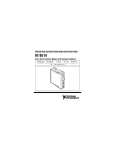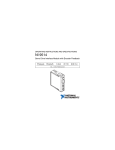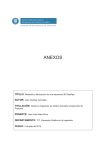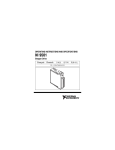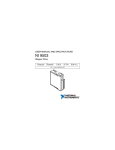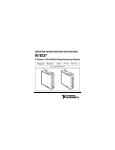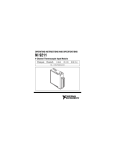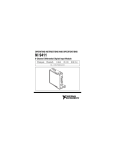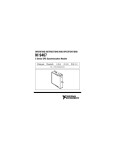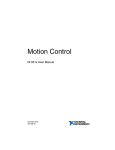Download NI 9512 Operating Instructions and Specifications
Transcript
OPERATING INSTRUCTIONS AND SPECIFICATIONS NI 9512 Stepper Drive Interface Module with Encoder Feedback Français Deutsch ni.com/manuals This document describes how to use the National Instruments 9512 module and includes specifications and pin assignments for the NI 9512. Visit ni.com/info and enter the Info Code rdsoftwareversion to determine which software you need for the modules you are using. For information about installing, configuring, and programming the system, refer to the system documentation. Visit ni.com/info and enter cseriesdoc for information about C Series documentation. Note The safety guidelines and specifications in this document are specific to the NI 9512. The other components in the system may not meet the same safety ratings and specifications. Refer to the documentation for each component in the system to determine the safety ratings and specifications for the entire system. Tip NI offers the P7000 series AC and DC stepper drives and matched stepper motors. Refer to Getting Started with NI 9512 C Series Drive Interface Modules and P7000 Series Stepper Drives for installation and configuration information for P7000 stepper drives. NI also offers AKD analog servo drives and matched servo motors. These drives accept step and direction signals from the NI 9512 module. Refer to Getting Started with NI 9512 C Series NI 9512 Operating Instructions and Specifications 2 ni.com Drive Interface Modules and AKD Analog Servo Drives for installation and configuration information for AKD servo drives. Refer to the Getting Started with NI 951x C Series Drive Interface Modules and LabVIEW for information about using the NI 9512 with other devices. Safety Guidelines Operate the NI 9512 only as described in these operating instructions. This icon denotes that the component may be hot. Touching this component may result in bodily injury. Hot Surface Special Conditions for Marine Applications Some modules are Lloyd’s Register (LR) Type Approved for marine applications. To verify Lloyd’s Register certification, go to ni.com/certification and search for the LR certificate, or look for the Lloyd’s Register mark on the module. © National Instruments Corp. 3 NI 9512 Operating Instructions and Specifications Caution To meet radio frequency emission requirements for marine applications, use shielded cables and install the system in a metal enclosure. Suppression ferrites must be installed on power supply inputs near power entries to modules and controllers. Power supply and module cables must be separated on opposite sides of the enclosure and must enter and exit through opposing enclosure walls. Connecting the NI 9512 The NI 9512 stepper drive interface module is part of a family of C Series motion modules. The module provides stepper drive interface signals for a single axis, a full set of motion I/O including inputs for a home switch and limit switches, incremental encoder inputs for position feedback, and 0 to 30 V digital input and output lines. The NI 9512 also includes a processor to run the spline interpolation engine and patented NI step generation algorithm. Working together they produce smoother motion resulting in precise stepper motion control. NI 9512 Operating Instructions and Specifications 4 ni.com System Connection The NI 9512 has two connectors, a 15-pin DSUB drive interface connector and a 20-pin MDR feedback connector. The 15-pin DSUB includes command signals for interfacing with stepper drives, 0 to 30 V general-purpose digital input and output lines, and a +19 to 30 V input for power connection. Refer to Table 1 for the DSUB connector pin assignments. The 20-pin MDR connector includes incremental encoder feedback inputs, a +5 V output for encoder power, home, limit, and position compare inputs, an output for position compare, an additional +19 to 30 V input for power connection, and an additional 0 to 30 V general-purpose digital input line. Refer to Figure 2 for the MDR connector pin assignments. Note The NI 9512 requires an external power supply. You can connect the external power supply to the Vsup input provided on the DSUB or MDR connector. Do not connect more than one external power supply to the module. National Instruments offers several options for connecting the NI 9512 to stepper drives. You can use the NI 9512-to-P7000 Stepper Drives Connectivity Bundle to connect the NI 9512 to the © National Instruments Corp. 5 NI 9512 Operating Instructions and Specifications P70530 or P70360 stepper drives from NI. You can also use the NI 9412 to AKD cable to connect to the AKD analog servo drive and AKM series servo motors from NI. To connect to third-party stepper drives, you can use the NI 951x Cable and Terminal Block Bundle. Refer to Figure 3 for the 37-pin terminal block pin assignments. Refer to the NI 951x User Manual, which you can download from ni.com/manuals, for information about additional connection accessories and cabling recommendations. Note You can connect the NI 9512 to drives that support position command mode. Refer to the NI 951x User Manual for more information. Complete the following steps to connect the NI 9512 stepper drive interface module to drives and other I/O: 1. Install the module in the chassis as specified in the chassis documentation. Note Refer to the NI SoftMotion Module book of the LabVIEW Help for information about chassis, slot, or software restrictions. NI 9512 Operating Instructions and Specifications 6 ni.com 2. Connect the module to a drive and other I/O using the NI 9512-to-P7000 Stepper Drives Connectivity Bundle, the NI 9512 to AKD cable, the NI 951x Cable and Terminal Block Bundle, or a custom cable for direct connectivity to third-party drives. 3. Connect the NI 9512 module to an external power supply. Caution Do not connect anything to pins marked Reserved. The 37-pin terminal block has separate Vsup and COM terminals for each connector. Make sure you are using the correct Vsup and COM terminals for the connector you are using. All signals associated with the DSUB connector in Figure 3 are marked with a dagger (†). Caution Figure 1 shows a simplified system connection diagram. © National Instruments Corp. 7 NI 9512 Operating Instructions and Specifications DSUB Connector Step±/CW MDR Connector Encoder 0 Phase A, B, Index Direction±/CCW +5 V OUT Drive Fault Forward, Reverse Limit, Home Drive Enable Vsup NI 9512 Limit and Home Sensors NI Connection Accessory/ Custom Cable Power Supply Step±/CW Direction±/CCW Drive Drive Fault Drive Enable Motor Stepper Motor Encoder (Optional) Figure 1. NI 9512 Connection Example NI 9512 Operating Instructions and Specifications 8 ni.com Table 1. NI 9512 DSUB Connector Pin Assignments Connector 15 11 © National Instruments Corp. 10 6 Pin 5 1 9 Signal 1 Reserved 2 Drive Enable 3 Digital Input 3 4 Digital Input 2 5 Digital Output 1 6 Reserved 7 COM 8 Digital Input 1 9 Direction (CCW)– 10 Step (CW)– 11 Digital Output 0 12 Vsup 13 Direction (CCW)+ 14 COM 15 Step (CW)+ NI 9512 Operating Instructions and Specifications Encoder 0 Phase B– Position Capture Encoder 0 Phase B+ Encoder 0 Phase A– Encoder 0 Phase A+ COM Reserved Vsup Reserved Reverse Limit 20 19 18 17 16 15 14 13 12 11 10 9 8 7 6 5 4 3 2 1 Position Compare +5 V OUT COM Encoder 0 Index– Encoder 0 Index+ COM Digital Input 0 COM Home Forward Limit Figure 2. NI 9512 MDR Connector Pin Assignments NI 9512 Operating Instructions and Specifications 10 ni.com COM 25 Encoder 0 Phase A+ 26 Encoder 0 Phase A– 27 Encoder 0 Phase B+ 28 Position Capture 29 Encoder 0 Phase B– 30 Reserved 31 Reserved 32 COM† 33 Drive Enable† 34 Digital Input 3† 35 Direction (CCW)–† 36 Digital Input 2† 37 Shield 18 GND Step (CW)+† 17 COM † 16 Direction (CCW)+ 15 † 14 Digital Input 1 Reserved 24 13 † Vsup 23 12 Digital Output 0† Reserved 22 11 Reserved Reverse Limit 21 10 Reserved Digital Output 1† 20 9 Position Compare 19 +5V OUT Vsup† † 8 COM 7 Encoder 0 Index– 6 Encoder 0 Index+ 5 COM 4 Digital Input 0 3 COM 2 Home 1 Forward Limit Step (CW)–† Indicates DSUB connector signals. Figure 3. NI 9512 37-Pin Terminal Block Pin Assignments © National Instruments Corp. 11 NI 9512 Operating Instructions and Specifications Signal Connections Figure 4 shows the NI 9512 block diagram. Phase A± (0) Phase B± (0) Receiver Circuitry Buffer Step ± Buffer Direction ± Buffer Position Compare Index± (0) Position Capture Buffer Home Microprocessor Drive Enable Forward Reverse Digital Input (0-3) Input Circuitry Digital Output (0-1) Output Circuitry Vsup COM +5V Reg +5V OUT Figure 4. NI 9512 Block Diagram NI 9512 Operating Instructions and Specifications 12 ni.com This document provides a brief overview of the module signal connections. Refer to the NI 951x User Manual, which you can download from ni.com/ manuals, for more information about signal connections. Note The NI 9512 module supports both industry standards for stepper command signals—step and direction, or clockwise (CW) and counterclockwise (CCW) pulse outputs. The step and direction output circuits are software configurable for either single-ended or differential output type. When connecting to drives with differential receiver inputs, configure the output type in software to differential and connect as shown in Figure 5. NI 9512 Drive Step+ / Dir+ Output Receiver Step– / Dir– Output Figure 5. Differential Step and Direction Output Connection © National Instruments Corp. 13 NI 9512 Operating Instructions and Specifications Many stepper drive manufacturers offer opto-isolated inputs for Step (CW)/Direction (CCW) signals. When connecting to opto-isolated inputs, configure the Step output type to single-ended, connect the NI 9512 Step+ output to the negative (cathode) side of the optocoupler input, and leave the Step– output on the NI 9512 disconnected. Connect the positive (anode) side of the drive input to a supply as specified by the drive manufacturer. Figure 6 shows a single-ended connection example. +5 V NI 9512 No Connection Drive Step–/Dir– Step+/Dir+ Step+/Dir+ Step–/Dir– Figure 6. Opto-Isolated Step and Direction Output Connection The encoder channel consists of a Phase A, a Phase B, and an Index input. The NI 9512 supports RS-422 differential and single-ended inputs for Phase A, Phase B, and Index signals, and provides a +5 V output for encoder power. National Instruments strongly recommends you use encoders with differential line driver outputs for optimized noise immunity and improved accuracy in all NI 9512 Operating Instructions and Specifications 14 ni.com applications. Figures 7 and 8 show simplified schematic diagrams of the encoder input circuit connected to differential and single-ended encoder outputs. NI 9512 Encoder Phase + +5 V Receiver Phase – COM Figure 7. Differential Encoder Input Circuit Encoder +5 V NI 9512 Phase+ +5 V Receiver No Phase– Connection Com COM Figure 8. Single-Ended Encoder Input Circuit © National Instruments Corp. 15 NI 9512 Operating Instructions and Specifications You can configure the Forward Limit, Reverse Limit, Home, and Digital Input <1..4> circuits in software for current sinking or sourcing output devices and set the active state of the inputs in software to on or off. To use the Drive Fault functionality referenced in Figure 1, you can map an available digital input in software. Figure 9 shows an example of wiring the inputs to a sourcing output device. PNP (Sourcing) Output Device NI 9512 V+ Out Limit, Home, or Digital Input Limit, Home, Configured or Digital Input For Sinking V– (Reference) COM Figure 9. Limit or Digital Input Circuit Configured for Sinking NI 9512 Operating Instructions and Specifications 16 ni.com Figure 10 shows an example of wiring the inputs to a sinking output device. NPN (Sinking) Output Device V+ Out NI 9512 NI 9512 Vsup Limit, Home, Configured or Digital Input For Sourcing Limit, Home, or Digital Input V– (Reference) COM Figure 10. Limit or Digital Input Circuit Configured for Sourcing The NI 9512 Drive Enable and Digital Output <1..2> circuits are software configurable for sinking or sourcing output type and the active state is software configurable for on or off. © National Instruments Corp. 17 NI 9512 Operating Instructions and Specifications Caution Do not connect digital outputs to +5 V input circuitry in either sinking or sourcing configuration. Only connect the Drive Enable output to +5 V input circuitry when the output is configured for sinking. Caution Figure 11 shows an example of wiring the outputs to a sinking input device. NPN (Sinking) Input Device NI 9512 NI 9512 Vsup Drive Enable or Digital Output V+ Drive Enable or Digital Output In Configured For Sourcing Sinking Circuit COM V– (Reference) Figure 11. Drive Enable or Digital Output Circuit Configured for Sourcing NI 9512 Operating Instructions and Specifications 18 ni.com Figure 12 shows an example of wiring the outputs to a sourcing input device. PNP (Sourcing) Input Device NI 9512 NI 9512 Vsup V+ Drive Enable or Digital Output Drive Enable or Digital Output Configured For Sinking Sourcing Circuit In V– COM (Reference) Figure 12. Drive Enable or Digital Output Circuit Configured for Sinking © National Instruments Corp. 19 NI 9512 Operating Instructions and Specifications LED Indicators The NI 9512 has four LEDs to display status information. 1 1 Axis Status (Green) 2 Encoder Active (Green) 2 3 4 3 Limit Active (Yellow) 4 Axis Fault (Red) Axis Status The Axis Status LED (green) has three states to display axis status. • Off—The module is in sleep mode or failed to boot correctly. Refer to the NI SoftMotion Module book of the LabVIEW Help for troubleshooting information. • Flashing—The module booted up correctly and is functional. • Lit—The module is functional and the drive enable output is active. NI 9512 Operating Instructions and Specifications 20 ni.com Encoder Active The Encoder Active LED (green) has three states for encoder and Vsup status. • Off—The required power supply (Vsup) is not connected. You must connect a power supply to receive encoder pulses. • Flashing—The power supply (Vsup) is connected and the module is receiving encoder pulses. Note The LED flash rate does not correspond to the rate at which the NI 9512 receives encoder pulses. • Lit—The power supply (Vsup) is connected but the module is not receiving encoder pulses. Limit Active The Limit Active LED (yellow) has two states to display the status of the limits and home input. • Off—The power supply (Vsup) is not connected, or both the limits and home input are not active. • Lit—The power supply (Vsup) is connected and the forward limit, reverse limit, or home input is active. © National Instruments Corp. 21 NI 9512 Operating Instructions and Specifications Axis Fault The Axis Fault LED (red) has two states to indicate the presence of a fault in the system. Refer to the NI SoftMotion Module book of the LabVIEW Help for a list of module faults and troubleshooting information. • Off—No module faults. • Lit—One or more module faults. Sleep Mode This module supports a low-power sleep mode. Support for sleep mode at the system level depends on the chassis that the module is plugged into. Refer to the chassis manual for information about support for sleep mode. If the chassis supports sleep mode, refer to the software help for information about enabling sleep mode. Visit ni.com/info and enter cseriesdoc for information about C Series documentation. Typically, when a system is in sleep mode, you cannot communicate with the modules. In sleep mode, the system consumes minimal power and may dissipate less heat than it does in normal mode. Refer to the Specifications section for more information about power consumption and thermal dissipation. NI 9512 Operating Instructions and Specifications 22 ni.com Specifications The following specifications are typical for the range –40 to 70 °C unless otherwise noted. All voltages are relative to COM unless otherwise noted. Stepper Performance Stepper accuracy ............................... 1 full, half, or microstep Interpolation/spline rate .................... 20 kHz max Motion Command Signals Stepper outputs Output type................................. Programmable: single-ended or differential Digital logic levels, single-ended High, VOH ................................... 5.25 V max Sourcing 20 mA ................... 3.5 V min Sourcing 12 mA ................... 3.7 V min Sourcing 4 mA ..................... 3.9 V min Low, VOL Sinking 20 mA ..................... 0.9 V max Sinking 12 mA ..................... 0.7 V max Sinking 4 mA ....................... 0.5 V max © National Instruments Corp. 23 NI 9512 Operating Instructions and Specifications Digital logic levels, differential (Step/Dir(+) – Step/Dir(–)) At 20 mA ............................. ±1 V min At 12 mA ............................. ±1.5 V min At 4 mA ............................... ±2 V min Max pulse rate ............................ 5 MHz Continuous output current on each channel .......................... ±20 mA Pulse width ................................. Approximately 50% of the period, up to 6.4 μs max Output mode............................... Programmable: step and direction, or CW/CCW Active state ................................. Programmable: high or low Drive enable output Output type................................. Programmable: sinking or sourcing Voltage range.............................. 0 to 30 V Vsup input.................................... 19 to 30 V Continuous output current (I0) on each channel .......................... ±100 mA max Output impedance (R0) ............... 0.3 Ω max NI 9512 Operating Instructions and Specifications 24 ni.com Output voltage (V0) sourcing...... Vsup – (I0R0) Output voltage (V0) sinking........ I0R0 Min output pulse width .............. 100 µs Active state ................................. Programmable: on or off Motion I/O Encoder 0 Phase A/B and Index inputs Type ............................................ RS-422 differential or single-ended inputs Digital logic levels, single-ended Voltage ................................. –0.25 to 5.25 V High, VIH.............................. 2.0 V min Low, VIL ............................... 0.8 V max Digital logic levels, differential (Phase(+) – Phase(–)) Input high range ................... 300 mV to 5 V Input low range .................... –300 mV to –5 V Common-mode voltage1 ...... –7 to 12 V Input current at 5 V .................... ±1 mA 1 Common-mode voltage is the average of Phase+ and Phase–. © National Instruments Corp. 25 NI 9512 Operating Instructions and Specifications Min pulse width1 Differential ........................... 100 ns Single-ended ........................ 400 ns Max count rate Differential ........................... 20 × 106 counts/sec Single-ended ........................ 5 × 106 counts/sec Forward, reverse, and home inputs Input type.................................... Programmable: sinking or sourcing Digital logic levels, OFF state Input voltage ........................ ≤5 V Input current......................... ≤250 μA Digital logic levels, ON state Input voltage ........................ 11 to 30 V Input current......................... ≥2 mA Input impedance ......................... 30 kΩ ±5% Min pulse width1 ........................ 100 μs 1 Assumes the minimum filter setting. Refer to the NI SoftMotion Module book of the LabVIEW Help for more information about filter options. NI 9512 Operating Instructions and Specifications 26 ni.com Position capture input Digital logic levels Voltage ................................. –0.25 to 5.25 V High, VIH.............................. 2.0 V min Low, VIL ............................... 0.8 V max Input current (0 V ≤ Vin ≤ 4.5 V) ..................... ±2 mA max Min pulse width1 ........................ 100 ns Max capture latency ................... 200 ns Capture accuracy ........................ ±1 count Active edge................................. Programmable: rising edge or falling edge Position compare outputs High, VOH ................................... 5.25 V max Sourcing 12 mA ................... 3.7 V min Sourcing 4 mA ..................... 3.9 V min 1 Assumes the minimum filter setting. Refer to the NI SoftMotion Module book of the LabVIEW Help for more information about filter options. © National Instruments Corp. 27 NI 9512 Operating Instructions and Specifications Low, VOL Sinking 12 mA ..................... 0.7 V max Sinking 4 mA ....................... 0.5 V max Compare mode ........................... Programmable: single or periodic Compare action .......................... Programmable: set, toggle, or pulse Max compare rate (periodic) ...... 5 MHz Pulse width (programmable) Min....................................... 100 ns Max ...................................... 1.6 ms Active state ................................. Programmable: high or low Digital I/O Inputs Number of inputs........................ 4 Input type.................................... Programmable: sinking or sourcing NI 9512 Operating Instructions and Specifications 28 ni.com Digital logic levels, OFF state Input voltage ........................ ≤5 V Input current......................... ≤250 μA Digital logic levels, ON state Input voltage ........................ 11 to 30 V Input current......................... ≥2 mA Input impedance ......................... 30 kΩ ±5% Min pulse width1 ........................ 100 μs Outputs Number of outputs...................... 2 Output type................................. Programmable: sinking or sourcing Voltage range.............................. 0 to 30 V Vsup input.................................... 19 to 30 V Continuous output current (I0) on each channel .......................... ±100 mA max Output impedance (R0) ............... 0.3 Ω max 1 Assumes the minimum filter setting. Refer to the NI SoftMotion Module book of the LabVIEW Help for more information about filter options. © National Instruments Corp. 29 NI 9512 Operating Instructions and Specifications Output voltage (V0) sourcing...... Vsup – (I0 R0) Output voltage (V0) sinking........ I0R0 Min output pulse width .............. 100 μs Leakage current .......................... 200 μA Active state ................................. Programmable: on or off MTBF ......................................... Contact NI for Bellcore MTBF or MIL-HDBK-217F specifications. Power Requirements Power consumption from chassis Active mode ............................... 925 mW max Sleep mode ................................. 0.4 mW max Thermal dissipation (at 70 °C) Active mode ............................... 1.5 W max Sleep mode ................................. 0.4 mW max Vsup input .......................................... 19 to 30 V, 375 mA max +5 V regulated output ....................... 5 V ±5%, 150 mA max NI 9512 Operating Instructions and Specifications 30 ni.com Physical Characteristics If you need to clean the module, wipe it with a dry towel. Note For two-dimensional drawings and three-dimensional models of the C Series module and connectors, visit ni.com/dimensions and search by module number. Weight............................................... 155 g (5.5 oz) Safety Safety Voltages Connect only voltages that are within the following limits. Channel-to-COM .............................. 0 to +30 VDC max, Measurement Category I Isolation Channel-to-channel .................... None Channel-to-earth ground Continuous ........................... 60 VDC, Measurement Category I Withstand ............................. 500 Vrms, verified by a 5 s dielectric withstand test © National Instruments Corp. 31 NI 9512 Operating Instructions and Specifications Measurement Category I is for measurements performed on circuits not directly connected to the electrical distribution system referred to as MAINS voltage. MAINS is a hazardous live electrical supply system that powers equipment. This category is for measurements of voltages from specially protected secondary circuits. Such voltage measurements include signal levels, special equipment, limited-energy parts of equipment, circuits powered by regulated low-voltage sources, and electronics. Do not connect the NI 9512 to signals or use for measurements within Measurement Categories II, III, or IV. Caution Safety Standards This product meets the requirements of the following standards of safety for electrical equipment for measurement, control, and laboratory use: • IEC 61010-1, EN 61010-1 • UL 61010-1, CSA 61010-1 Note For UL and other safety certifications, refer to the product label or the Online Product Certification section. NI 9512 Operating Instructions and Specifications 32 ni.com Electromagnetic Compatibility This product meets the requirements of the following EMC standards for electrical equipment for measurement, control, and laboratory use: • EN 61326-1 (IEC 61326-1): Class A emissions; Industrial immunity • EN 55011 (CISPR 11): Group 1, Class A emissions • AS/NZS CISPR 11: Group 1, Class A emissions • FCC 47 CFR Part 15B: Class A emissions • ICES-001: Class A emissions Note For the standards applied to assess the EMC of this product, refer to the Online Product Certification section. Note For EMC compliance, operate this device with double-shielded cables. © National Instruments Corp. 33 NI 9512 Operating Instructions and Specifications CE Compliance This product meets the essential requirements of applicable European Directives as follows: • 2006/95/EC; Low-Voltage Directive (safety) • 2004/108/EC; Electromagnetic Compatibility Directive (EMC) Online Product Certification Refer to the product Declaration of Conformity (DoC) for additional regulatory compliance information. To obtain product certifications and the DoC for this product, visit ni.com/ certification, search by module number or product line, and click the appropriate link in the Certification column. Shock and Vibration To meet these specifications, you must panel mount the system. Operating vibration Random (IEC 60068-2-64)......... 5 grms, 10 to 500 Hz Sinusoidal (IEC 60068-2-6) ....... 5 g, 10 to 500 Hz Operating shock (IEC 60068-2-27)....30 g, 11 ms half sine, 50 g, 3 ms half sine, 18 shocks at 6 orientations NI 9512 Operating Instructions and Specifications 34 ni.com Environmental National Instruments C Series modules are intended for indoor use only, but may be used outdoors if installed in a suitable enclosure. Refer to the manual for the chassis you are using for more information about meeting these specifications. Operating temperature (IEC 60068-2-1, IEC 60068-2-2) ..... –40 to 70 °C Storage temperature (IEC 60068-2-1, IEC 60068-2-2) ..... –40 to 85 °C Ingress protection.............................. IP 40 Operating humidity (IEC 60068-2-56)10 to 90% RH, noncondensing Storage humidity (IEC 60068-2-56).............................. 5 to 95% RH, noncondensing Maximum altitude............................. 2,000 m Pollution Degree ............................... 2 © National Instruments Corp. 35 NI 9512 Operating Instructions and Specifications Environmental Management National Instruments is committed to designing and manufacturing products in an environmentally responsible manner. NI recognizes that eliminating certain hazardous substances from our products is beneficial to the environment and to NI customers. For additional environmental information, refer to the NI and the Environment Web page at ni.com/environment. This page contains the environmental regulations and directives with which NI complies, as well as other environmental information not included in this document. Waste Electrical and Electronic Equipment (WEEE) At the end of the product life cycle, all products must be sent to a WEEE recycling center. For more information about WEEE recycling centers, National Instruments WEEE initiatives, and compliance with WEEE Directive 2002/96/EC on Waste and Electronic Equipment, visit ni.com/environment/weee. EU Customers NI 9512 Operating Instructions and Specifications 36 ni.com ⬉ᄤֵᙃѻક∵ᶧࠊㅵ⧚ࡲ⊩ ˄Ё RoHS˅ Ёᅶ᠋ National Instruments ヺড়Ё⬉ᄤֵᙃ ѻકЁ䰤ࠊՓ⫼ᶤѯ᳝ᆇ⠽䋼ᣛҸ (RoHS)DŽ݇Ѣ National Instruments Ё RoHS ড়㾘ᗻֵᙃˈ䇋ⱏᔩ ni.com/environment/rohs_chinaDŽ (For information about China RoHS compliance, go to ni.com/ environment/rohs_china.) Where to Go for Support The National Instruments Web site is your complete resource for technical support. At ni.com/support you have access to everything from troubleshooting and application development self-help resources to email and phone assistance from NI Application Engineers. National Instruments corporate headquarters is located at 11500 North Mopac Expressway, Austin, Texas, 78759-3504. National Instruments also has offices located around the world to help address your support needs. For telephone support in the United States, create your service request at ni.com/support and follow the calling instructions or dial 512 795 8248. For © National Instruments Corp. 37 NI 9512 Operating Instructions and Specifications telephone support outside the United States, contact your local branch office: Australia 1800 300 800, Austria 43 662 457990-0, Belgium 32 (0) 2 757 0020, Brazil 55 11 3262 3599, Canada 800 433 3488, China 86 21 5050 9800, Czech Republic 420 224 235 774, Denmark 45 45 76 26 00, Finland 358 (0) 9 725 72511, France 01 57 66 24 24, Germany 49 89 7413130, India 91 80 41190000, Israel 972 3 6393737, Italy 39 02 41309277, Japan 0120-527196, Korea 82 02 3451 3400, Lebanon 961 (0) 1 33 28 28, Malaysia 1800 887710, Mexico 01 800 010 0793, Netherlands 31 (0) 348 433 466, New Zealand 0800 553 322, Norway 47 (0) 66 90 76 60, Poland 48 22 328 90 10, Portugal 351 210 311 210, Russia 7 495 783 6851, Singapore 1800 226 5886, Slovenia 386 3 425 42 00, South Africa 27 0 11 805 8197, Spain 34 91 640 0085, Sweden 46 (0) 8 587 895 00, Switzerland 41 56 2005151, Taiwan 886 02 2377 2222, Thailand 662 278 6777, Turkey 90 212 279 3031, United Kingdom 44 (0) 1635 523545 NI 9512 Operating Instructions and Specifications 38 ni.com LabVIEW, National Instruments, NI, ni.com, the National Instruments corporate logo, and the Eagle logo are trademarks of National Instruments Corporation. Refer to the Trademark Information at ni.com/trademarks for other National Instruments trademarks. Other product and company names mentioned herein are trademarks or trade names of their respective companies. For patents covering National Instruments products/technology, refer to the appropriate location: Help»Patents in your software, the patents.txt file on your media, or the National Instruments Patent Notice at ni.com/patents. © 2009–2010 National Instruments Corp. All rights reserved. 374555C-01 Jun10







































